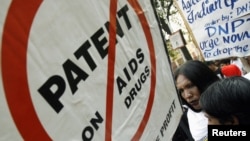NEW DELHI / MUMBAI —
The United States on Thursday voiced concern over protection of patents on safer and more effective next-generation medicines in India amid fears that authorities are considering allowing more Indian firms to make new varieties of cheap generic drugs still on patent.
An Indian committee is reviewing up to a dozen patented drugs to see if so-called compulsory licenses, which in effect break exclusivity rights, can be issued for some of them, two senior government officials said last month.
"I understand that India has issued one compulsory license, but there's a lot of concern about what additional licenses are being considered," U.S. Assistant Secretary of State Nisha Biswal told reporters in the Indian capital.
"There's concern about... whether next-generation drugs would be protected, and how do you ensure that investments that are being made to develop ever-more effective drugs can then be continued," Biswal continued.
In 2012, India issued its first-ever compulsory license to domestic drugmaker Natco Pharma Ltd on a kidney and liver cancer drug, Nexavar, patented by Germany's Bayer.
That and a series of recent decisions on patented drugs in India, as part of New Delhi's push to increase access to life-saving treatments, is at the center of trade friction between Asia's third-largest economy and the United States.
Like other emerging markets, such as South Africa and China, India is battling to bring down healthcare costs and boost access to drugs to treat diseases such as cancer, HIV/AIDS and hepatitis.
Western drugmakers, including Pfizer, Novartis, Roche Holding and Sanofi, covet a bigger share of the fast-growing drugs market in India.
However, they have been frustrated by a series of decisions on patents and pricing, as part of New Delhi's push to increase access to treatments in a country where only 15 percent of the 1.2 billion people have health insurance.
"The constant threat of compulsory licenses hangs like a Damocles sword over patent-holders," Ranjit Shahani, vice chairman and managing director of Novartis' India unit, told Reuters in an interview on Tuesday.
"Over the past two years, the government of India has issued several intellectual property decisions that disproportionately impact innovative biopharmaceutical companies," he said. "Not only is this a concern for business in the Indian market, but also in other emerging markets that may see India as a model to be emulated."
India is on the U.S. government's Priority Watch List - countries whose practices on protecting intellectual property Washington believes should be monitored closely.
U.S. industry trade group Pharmaceutical Research and Manufacturers of America (PhRMA) believes Washington should take a tougher line by downgrading it to a Priority Foreign Country, a classification for the worst offenders, which could trigger possible actions, sources said last month.
If India is relegated by the U.S. to Priority Foreign Country level, it would join Ukraine as the second country in that segment. Countries in the Priority Watch List include China, Indonesia, Pakistan, Russia, Thailand and Argentina.
An Indian committee is reviewing up to a dozen patented drugs to see if so-called compulsory licenses, which in effect break exclusivity rights, can be issued for some of them, two senior government officials said last month.
"I understand that India has issued one compulsory license, but there's a lot of concern about what additional licenses are being considered," U.S. Assistant Secretary of State Nisha Biswal told reporters in the Indian capital.
"There's concern about... whether next-generation drugs would be protected, and how do you ensure that investments that are being made to develop ever-more effective drugs can then be continued," Biswal continued.
In 2012, India issued its first-ever compulsory license to domestic drugmaker Natco Pharma Ltd on a kidney and liver cancer drug, Nexavar, patented by Germany's Bayer.
That and a series of recent decisions on patented drugs in India, as part of New Delhi's push to increase access to life-saving treatments, is at the center of trade friction between Asia's third-largest economy and the United States.
Like other emerging markets, such as South Africa and China, India is battling to bring down healthcare costs and boost access to drugs to treat diseases such as cancer, HIV/AIDS and hepatitis.
Western drugmakers, including Pfizer, Novartis, Roche Holding and Sanofi, covet a bigger share of the fast-growing drugs market in India.
However, they have been frustrated by a series of decisions on patents and pricing, as part of New Delhi's push to increase access to treatments in a country where only 15 percent of the 1.2 billion people have health insurance.
"The constant threat of compulsory licenses hangs like a Damocles sword over patent-holders," Ranjit Shahani, vice chairman and managing director of Novartis' India unit, told Reuters in an interview on Tuesday.
"Over the past two years, the government of India has issued several intellectual property decisions that disproportionately impact innovative biopharmaceutical companies," he said. "Not only is this a concern for business in the Indian market, but also in other emerging markets that may see India as a model to be emulated."
India is on the U.S. government's Priority Watch List - countries whose practices on protecting intellectual property Washington believes should be monitored closely.
U.S. industry trade group Pharmaceutical Research and Manufacturers of America (PhRMA) believes Washington should take a tougher line by downgrading it to a Priority Foreign Country, a classification for the worst offenders, which could trigger possible actions, sources said last month.
If India is relegated by the U.S. to Priority Foreign Country level, it would join Ukraine as the second country in that segment. Countries in the Priority Watch List include China, Indonesia, Pakistan, Russia, Thailand and Argentina.





